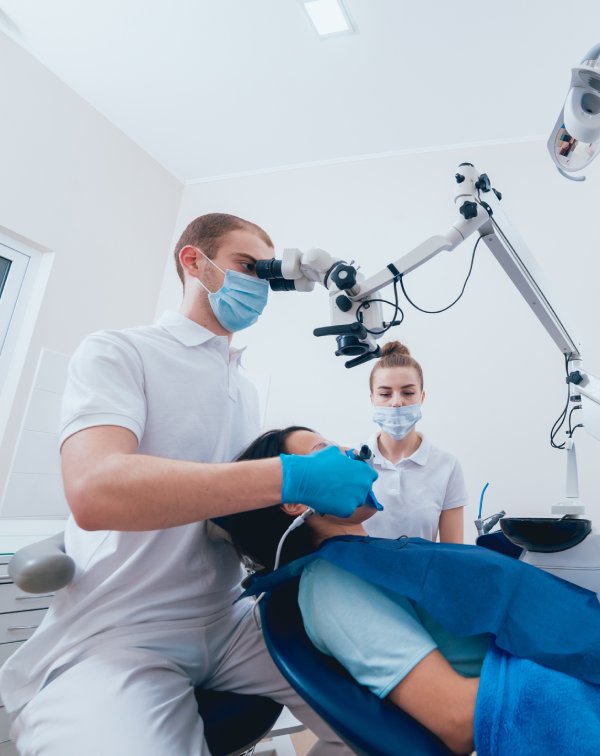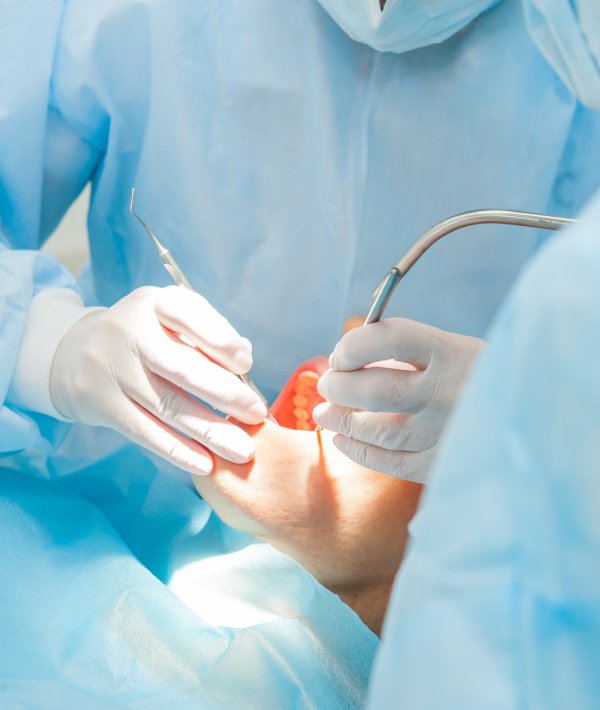STETTLER DENTAL
Dental Specialties At Your Dental Clinic In Stettler
Stettler Dental Specialties
Canada recognizes nine different dental specialties and your dental clinic in Stettler has a specialist ready to take care of you in four of these disciplines. Dental specialists have advanced and specific education in their chosen specialty on top of standard dental education. If you need to see one of our partner specialists, we will make a referral for you to ensure you receive adequate care.
Endodontics at your Dental Clinic in Stettler
Endodontics is a dental discipline specializing in the care of tissues inside the tooth. An endodontist can diagnose and treat the problem if you are experiencing tooth pain from a complex issue. Endodontic treatment is available at your dental clinic in Stettler to help alleviate tooth pain and solve problems in the pulp of your teeth by referral.
What is Tooth Pulp?
The tooth pulp is the name for the nerves, blood vessels, and tissues deep within your tooth. If this pulp is infected or damaged, it can cause severe pain and even result in the death and loss of your tooth. When you’re experiencing tooth pain, it may be because of damage to the pulp, and you might require a root canal.
What Does an Endodontist Do?
Endodontists most often perform root canal therapy for patients with an infection in the pulp of a tooth. They are experts in diagnosing and treating tooth pain. Alongside root canals, endodontists can perform a number of other procedures, such as tooth extraction or specialized endodontic surgeries.
Oral and Maxillofacial Surgery at your Dental Clinic in Stettler
As frustrating and anxiety-inducing as surgery can be, it is sometimes necessary to alleviate pain and prevent dental issues further down the line. The team at your dental clinic in Stettler, wants you to feel as comfortable as possible throughout the entire surgery process. We partner with oral surgeons who are dedicated to performing safe, effective procedures.
What is Oral and Maxillofacial Surgery?
Oral and maxillofacial surgery is surgery performed in the oral cavity. This might include difficult tooth extractions, wisdom teeth removal, placing dental implants, or performing bone grafts. Oral and maxillofacial surgeons, also called OMS, have undergone advanced education and training to be able to perform such procedures.
What to Expect During Your Surgery
The process of your oral surgery here at your dental clinic in Stettler, will change depending on the procedure being done. Before your surgery, your OMS will perform an evaluation of your teeth, mouth, face, and neck and take X-rays. You may receive one of several sedation options, including nitrous oxide, oral medication, and IV sedation. Following the surgery, your OMS will give you a set of guidelines to follow as you heal.
Oral Surgery at your Dental Clinic in Stettler
No one wants to have surgery done, but it might be necessary to maintain proper oral health. Whether you need impacted wisdom teeth removed or a particularly nasty tooth pulled, oral surgery here at your dental clinic in Stettler, can keep your smile bright and healthy.
What Does an Oral Surgeon Do?
Oral surgery encompasses a wide variety of procedures, from wisdom teeth removal to bone grafting. But contrary to what you might expect, not everyone who performs oral surgery is an oral surgeon. Oral surgery is actually one of nine dental specialties that some dentists perform with the help of advanced education. In other words, every oral surgeon is a dentist, but not every dentist is an oral surgeon.
Your Oral Surgery Appointment
You will be given specific guidelines to follow before, during, and after your surgery. Be sure to follow these guidelines–we give them to you for a reason, and neglecting them can have unwanted consequences. With so many types of oral surgery out there, the process will vary for everyone. The surgeons here at your dental clinic in Stettler, provide high-quality, effective surgeries for a variety of issues so you can maintain proper oral health.
Pediatric Dentistry at your Dental Clinic in Stettler
Teaching children how to take care of their teeth is one of our most important goals at Stettler Dental. Education about your oral health from a young age is the best way to prevent future problems ranging from cavities to gum disease. Our team here at your dental clinic in Stettler, highly recommends visiting a dentist by your child’s first birthday or six months after their first tooth erupts.
Your Child’s First Dental Appointment
Your child’s first visit to the dentist will be short and straightforward. Your dentist will count their teeth and examine the mouth to ensure there is no decay and that teeth are growing into their proper positions. Your dentist will also talk to you about oral hygiene habits and taking care of your child’s dental health. This is also the perfect time to ask any questions you might have about maintaining your child’s oral hygiene.
Easing Dental Anxiety For Children
Many children have negative associations with the dentist or are at risk of developing those negative ideas. There are several ways to ease their anxiety before and during the appointment. Bringing something to distract or comfort them during the appointment, whether it’s a toy, music, blanket, or other comfort objects, can help keep them calm. Positive reinforcement can also help your child through the process, such as going to their favourite playground after. Always be sure to maintain a positive mindset and encourage your children to view the dentist as a new, interesting, and essential experience.
Stettler Dental
Accepting New Patients





